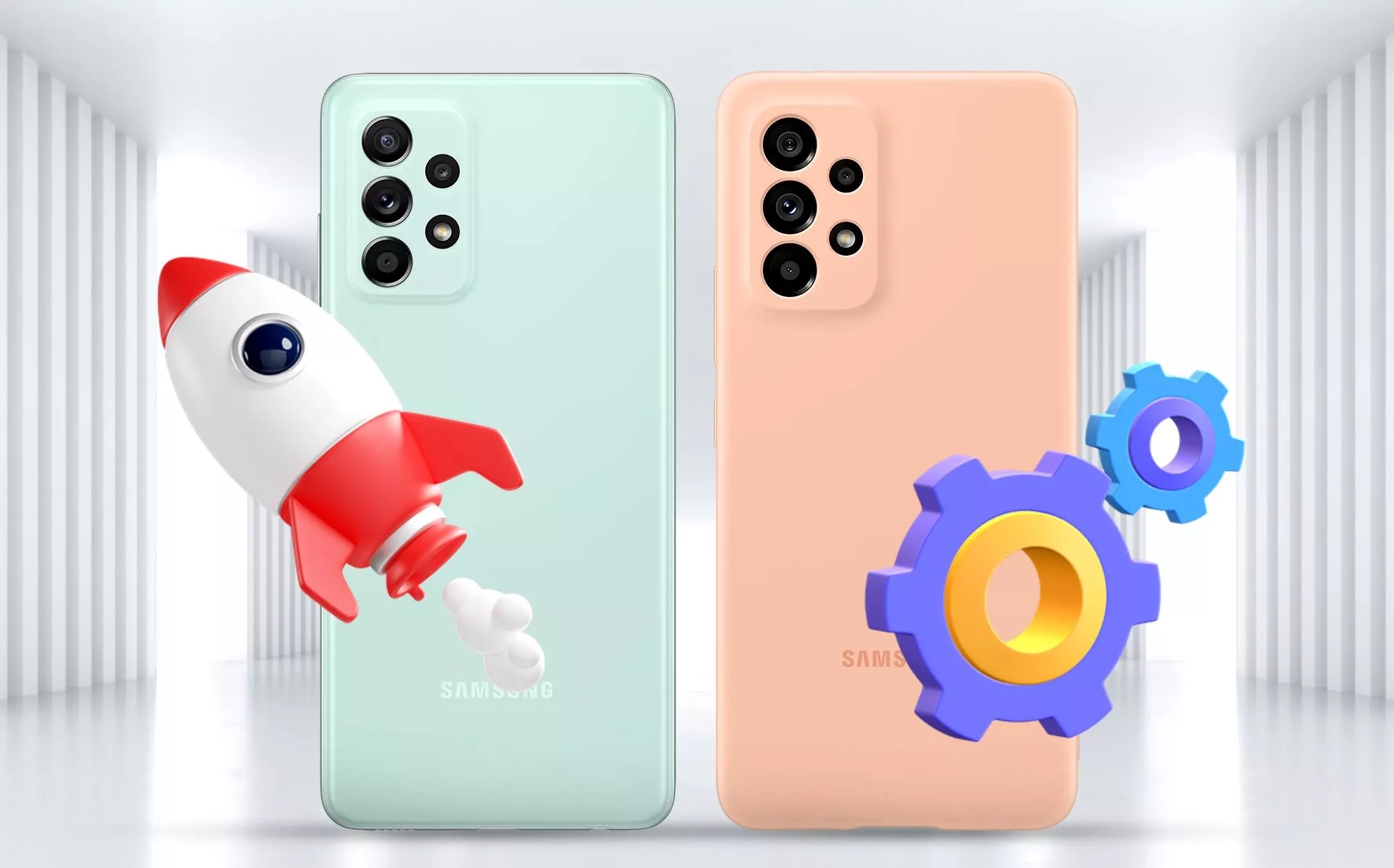Compare Galaxy A53 With Galaxy A52 And A52s; Popular Intermediaries Based On Shared Heritage
What Does Samsung’s Latest Midfielder Have To Say About The Galaxy A52 And A52s? Compare The Galaxy A53 With The Previous Generation.
Given the popularity of mid-range phones in recent years, Samsung has opened a particular account on the Galaxy A family. The evidence shows the success of the Koreans in this area. Meanwhile, the Galaxy A52 and especially the A52s can be considered a turning point for Samsung; Well-built handsets that, by offering decent specifications at a reasonable price, we’re able to become one of the best-selling phones in many of their markets and become a nightmare for competitors.
The Galaxy A52 and A52s are also very popular in the Iranian market, and now with the introduction of the Galaxy A53, it is natural that many people are hesitant to choose their next smartphone; Therefore, after an in-depth review of the Galaxy A53, we have compared it to two other galaxy mid-range devices to give you, dear users, a good view of their similarities and differences. Follow the comparison of Galaxy A53 with Galaxy A52.
Design and build quality
As usual, our first criterion for testing the differences between two phones starts from the design section; Where the user’s first visual experience with the smartphone is formed, and therefore, good build quality and pleasant design can be a critical component in the selection; Of course, users will not have a hard time in this area; The Galaxy A53 uses a minimal design language that is very slightly different from the A52 and A52s.
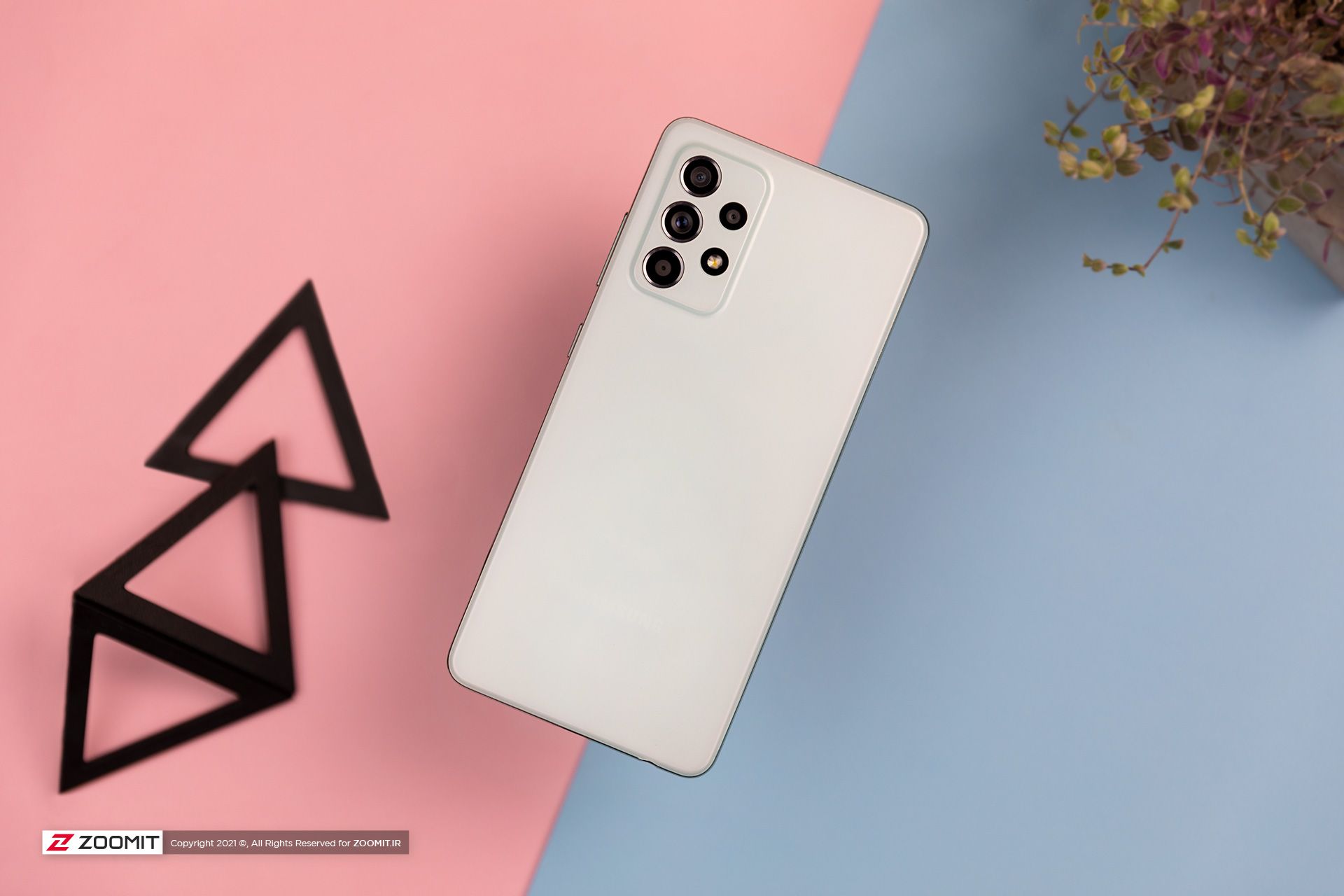
Samsung designers have combined their winning combination of Galaxy A series mid-range devices with a slight change in the frame of the device, which ironically not only improves the old body but may also make the feeling of holding the phone a little uncomfortable; The Galaxy A52s frame is now flat following the design language of the Galaxy S22.
All three devices with a 6.5-inch screen and weighing 189 grams are relatively lovely phones, but their perfectly homogeneous and plastic body can slightly reduce the sense of the quality of the device. In general, the only difference in the body of the device is due to the new mid-size dimensions, which in fact, its thickness and width are reduced by only 0.3 mm compared to the A52 and A52s.
The matte effect of the back panel of all three phones looks visually beautiful, But this does not mean that they do not absorb fingerprints and dirt, especially in dark colors. On the back panel of all models, there is a quad-camera array on a rectangular module that is somehow attached to the body; Of course, the bulge thickness of the Galaxy A53 camera has slightly decreased.
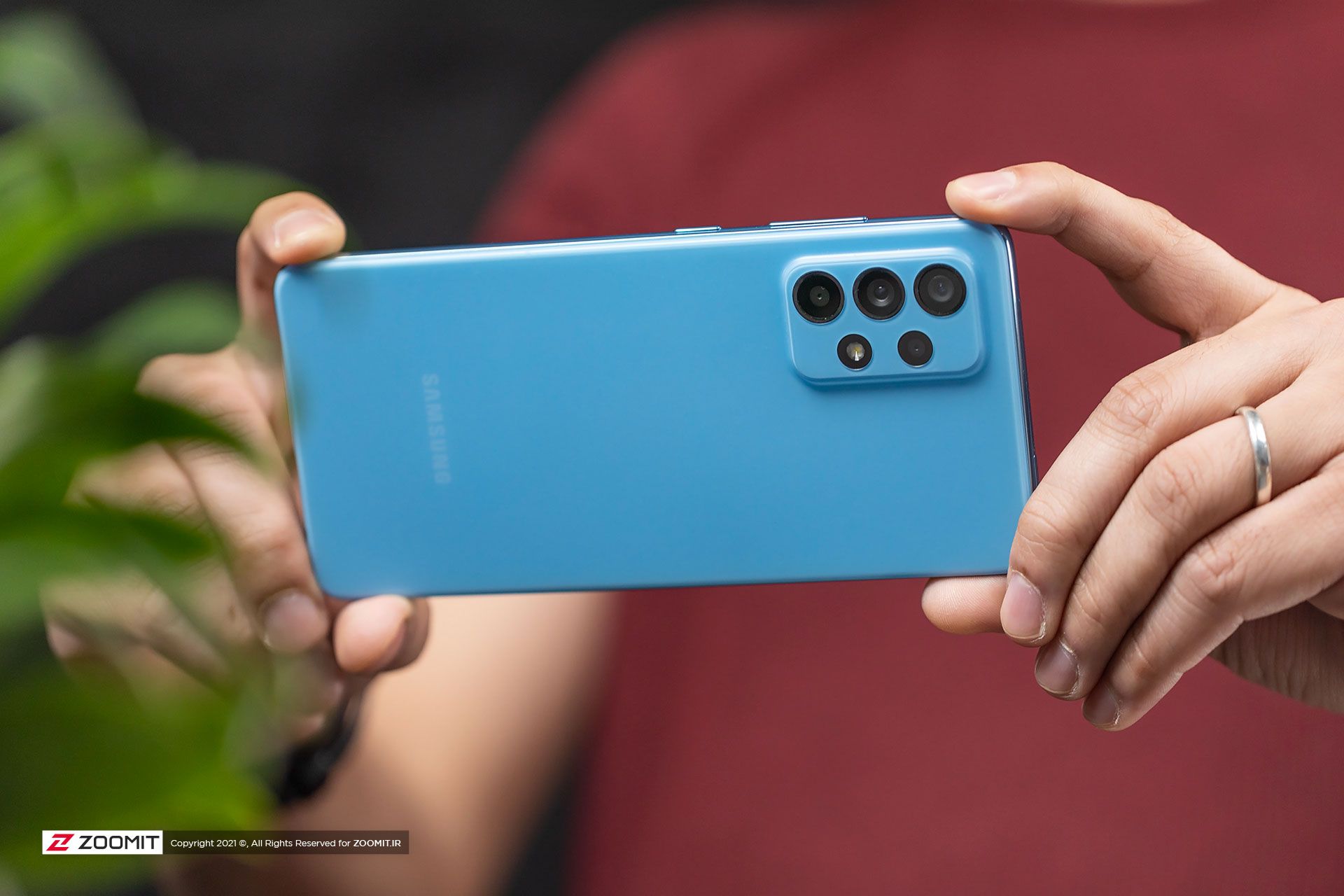
Standard Galaxy A52
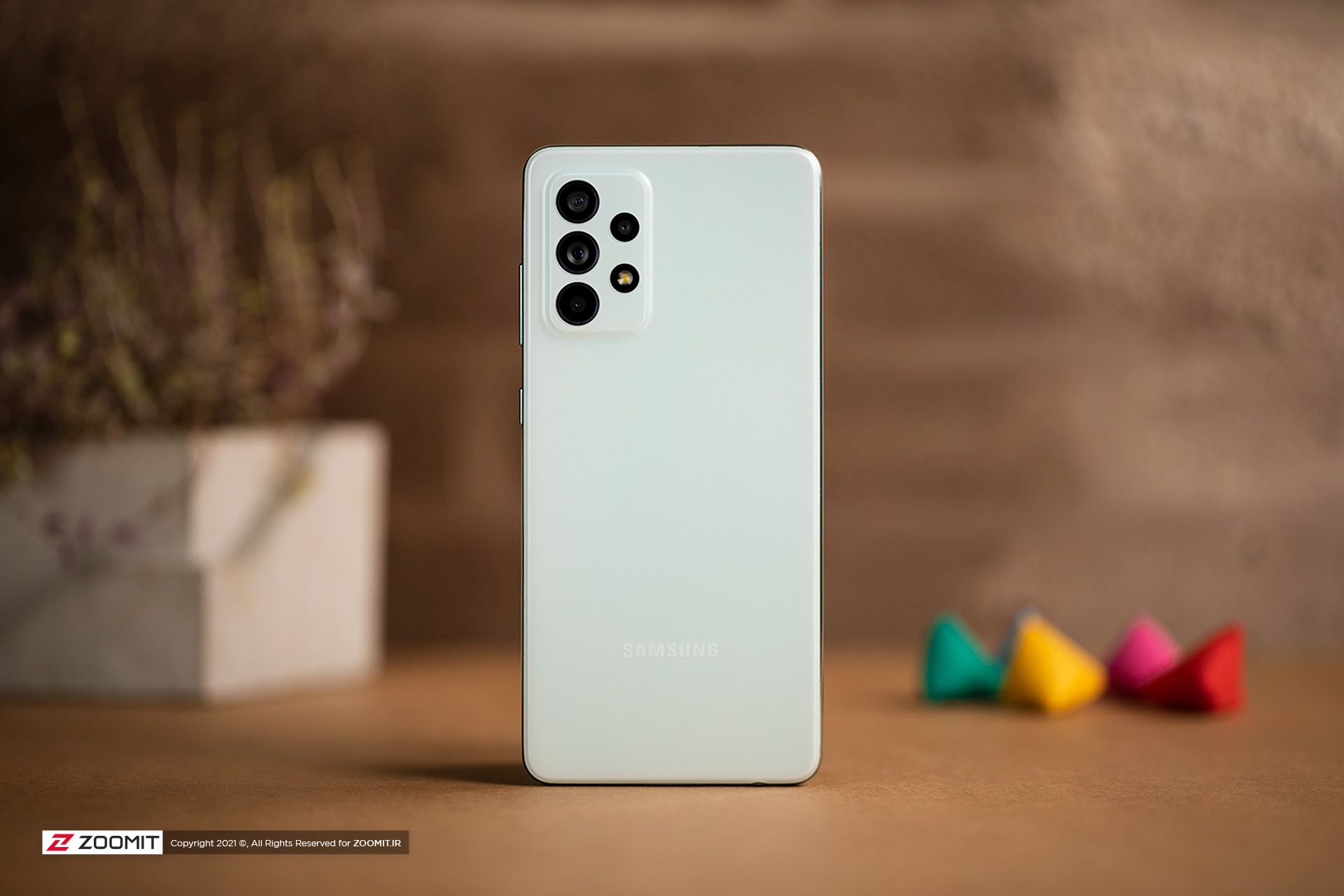
Galaxy A52s
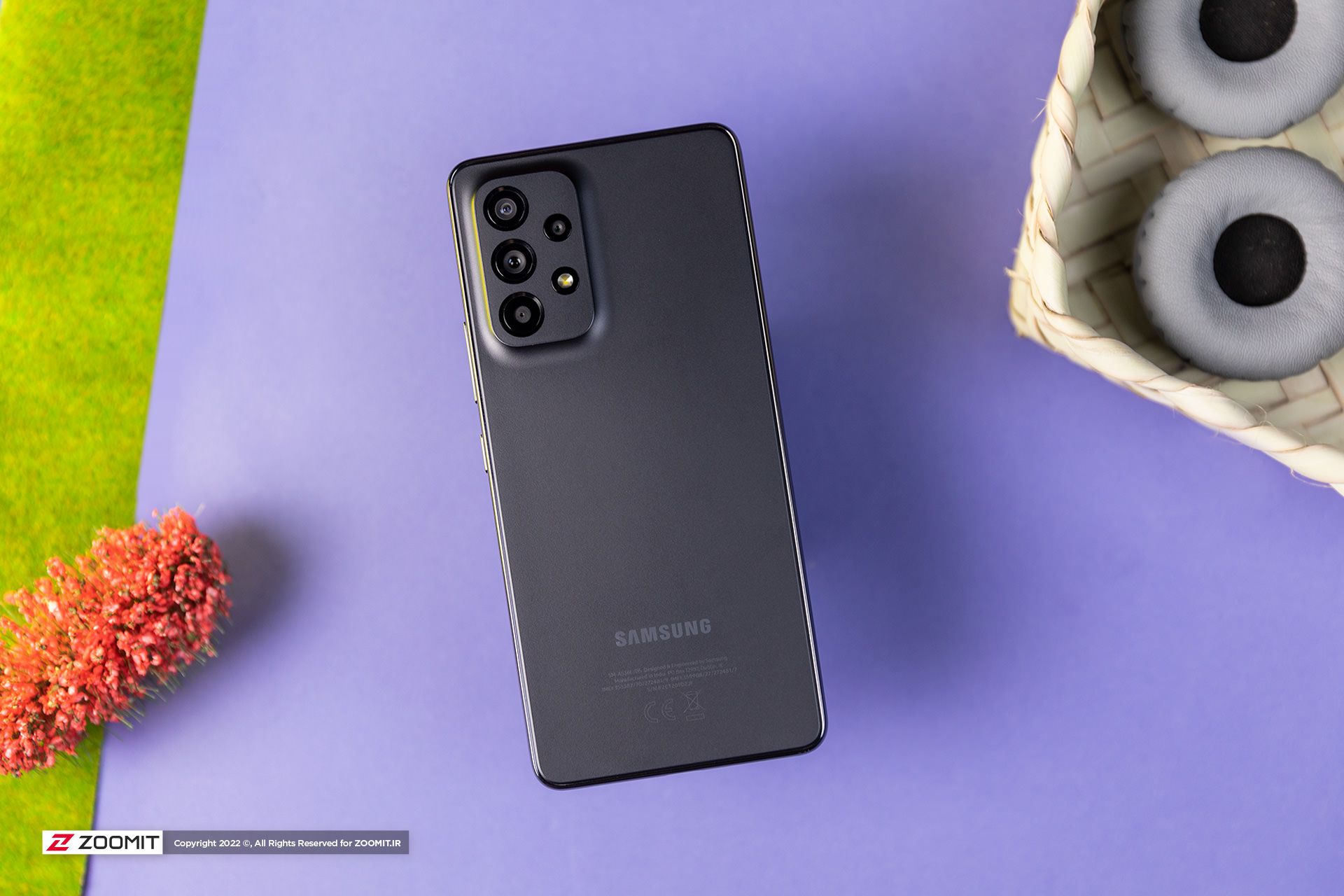
Galaxy A53
All three models are IP67 certified; they can last up to 30 minutes in one water meter in laboratory conditions. In addition, the Korean company uses a fingerprint sensor under the display with precisely the exact specifications and coverage level to authenticate users’ biometrics. Fortunately, fingerprint sensors performed well in our experiments; But they are not as fast as some competitors.
Thus, the design part certainly can not have a significant impact on the choice between the two phones, and perhaps, the ergonomics of the Galaxy A52 and A52s maybe a little more pleasant due to the greater curvature of the frame.
Display
The display is another essential component and the interface between the user and the world of smartphones, and this is precisely where the Koreans have always been exceptionally skilled. On paper, there is no significant difference between the screens, and all models use a 6.5-inch OLED panel with a resolution of 2400 x 1080 pixels and support for a refresh rate of 120 pixels to immerse users in visual content.
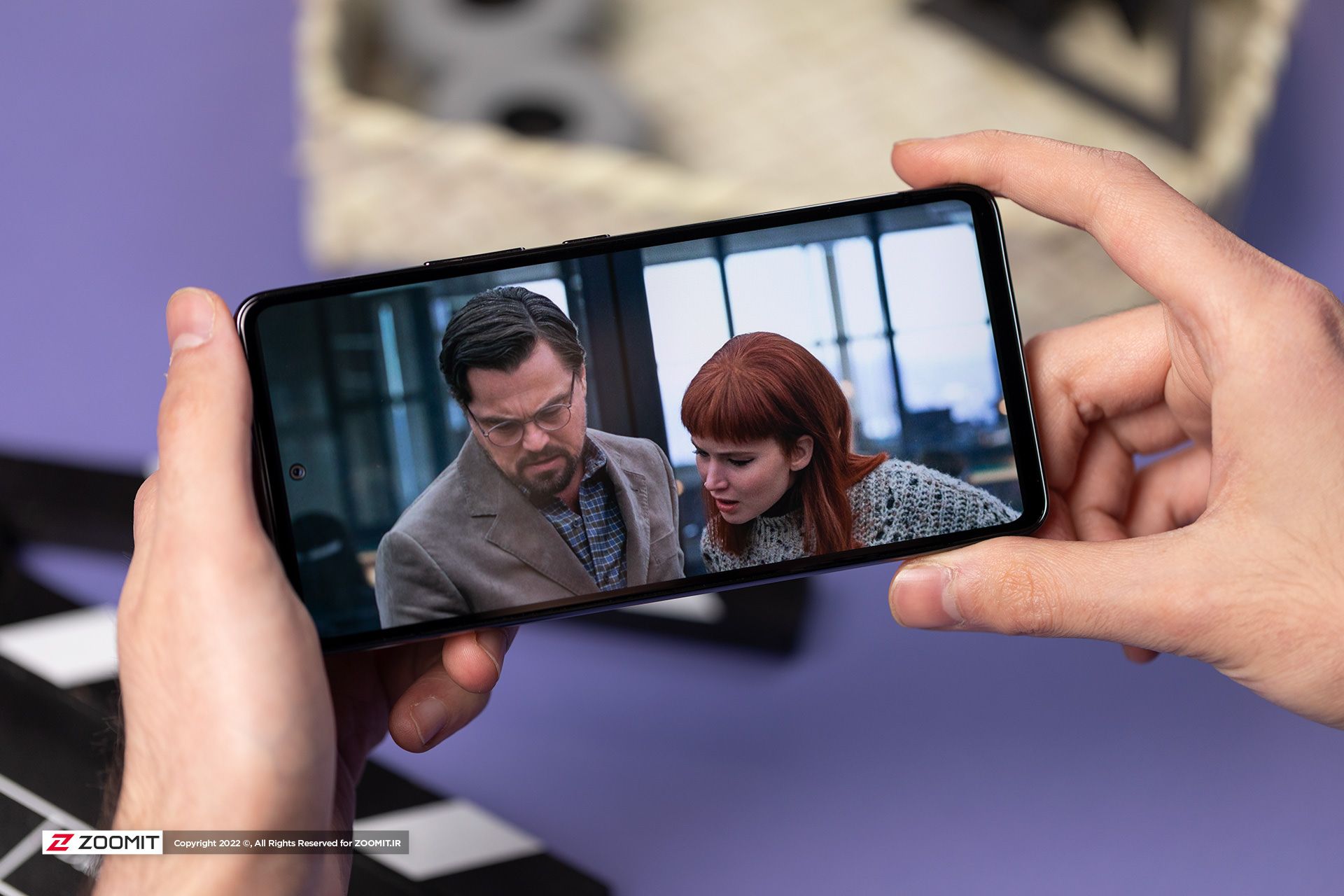
To get more and more in the monitor’s field, we went to Zomit-specific benchmarks in the laboratory. Our experiments show that the maximum brightness of the Galaxy S A53 display in manual mode is higher than the previous generation. Still, intuitively, it more or less shows the same Performance.
Compare Galaxy A53 display with Galaxy A52 and A52s | ||||||||
|---|---|---|---|---|---|---|---|---|
| Product ام Parameters | Minimum brightness | Maximum manual brightness | Maximum automatic brightness | Native contrast ratio | Average color error | |||
| White | Black | White | Black | White | Default mode | The most accurate mode | ||
| Galaxy A53 | 2.44 | ۰ | 640.5 | ۰ | 1290 | ∞ | 3.3 | 1.9 (Natural) |
| Galaxy A52s | 2.3 | ۰ | 607.5 | ۰ | 1305 | ∞ | 4.8 | 3.1 (Natural) |
| Galaxy A52 | 1.81 | ۰ | 587 | ۰ | 1230 | ∞ | 5.3 | 3.2 (Natural) |
The screens of all three phones offer excellent brightness in the intermediate price range So that they can use in the sun without a bit of challenge. The color error test is where the difference is revealed. The Galaxy A53 display produces more accurate colors by default on the Vivid or Natural profiles.
Hardware and Performance
Going through the display, we come to one of the essential parts of buying almost any electronic device. SOCs form the beating heart of smartphones, and a powerful chip can ensure Performance, stability, and even multiple, hassle-free updates for years; Of course, it may not be unreasonable to say that the Koreans have taken one step forward and two steps back in this regard; This is because the Galaxy A53 while having more processing power than the A52, is in the shadow of the A52s by a distance.
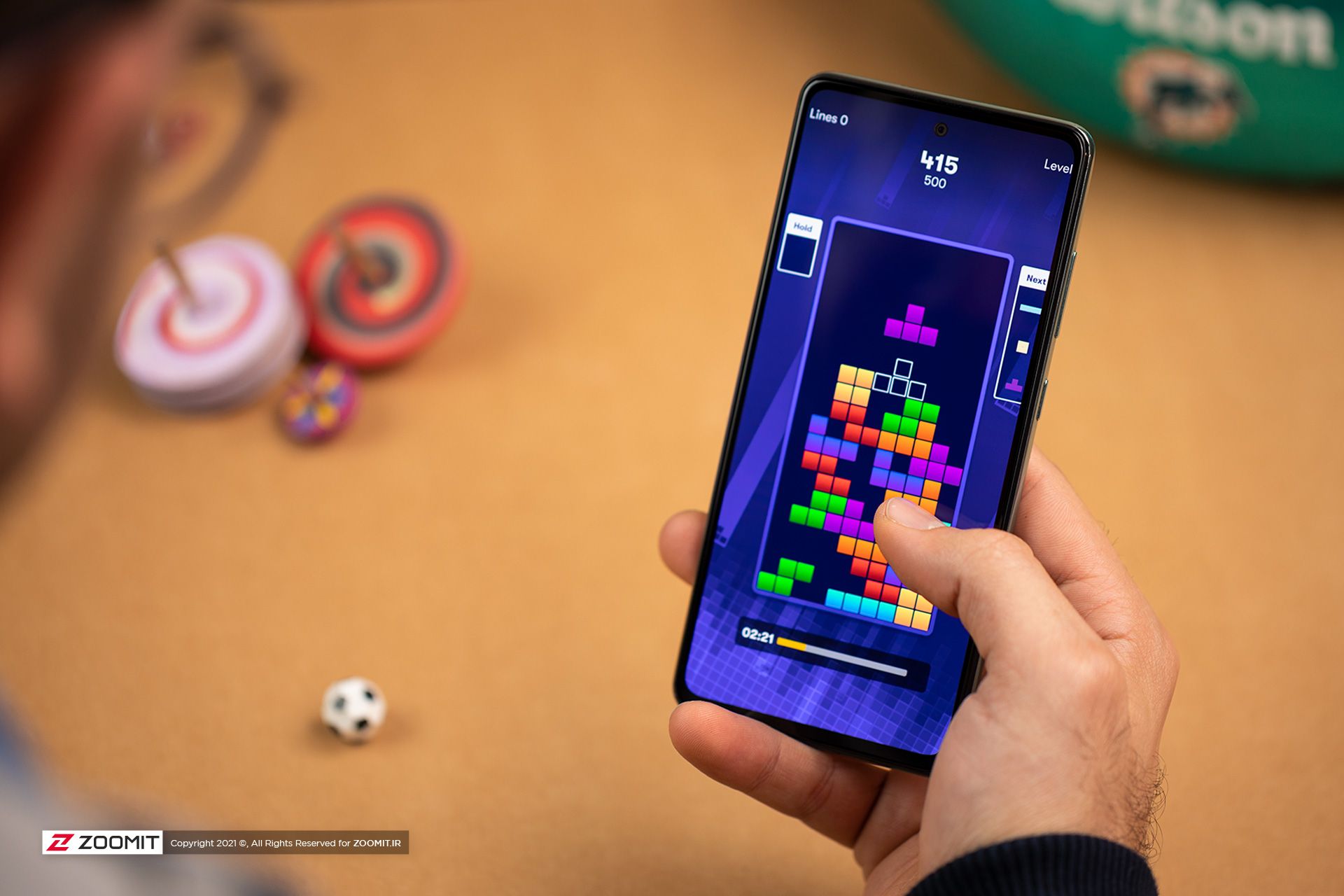
The Koreans do not strangely specify what chips they used inside the latest A-Series mid-range phone. Still, with a bit of scrutiny, we found that the phone’s processing power is provided by the Exynos 1280, which, as usual, its first CPU cluster consists of strong cores with a 2.40 GHz dual-core Cortex A78; The next cluster includes the weaker 6-core Cortex A55 with a maximum frequency of 2.0 GHz. Finally, the Mali-G68 GPU is responsible for GPUs.
On the other hand, the beating heart of the Galaxy A52s is powered by Qualcomm’s 6nm Snapdragon 778G 5G chip and the Adreno 642L GPU, and the standard model is powered by the Snapdragon 750G chip, which naturally has a dual-core and GPU. Avoiding specifications on paper, we first compared all three handsets to the Geekbench 5 benchmark to measure the Performance of their cores.
Shocking results show that the Snapdragon 778G 5G chip is approximately 31.4% faster in the multi-core test than Samsung’s new chip! The CPU performance gap is narrowed in single-core processors, and the chip used in the Galaxy A53 reduces the performance difference to three percent; However, if we consider the standard version, we see a somewhat similar scenario; The Galaxy A53 offers the same Performance in multi-core processing as its predecessor, the Galaxy A52 5G.
Compare the Performance of the Galaxy A53 with the Galaxy A52 and A52s | |||||||||
|---|---|---|---|---|---|---|---|---|---|
| Name and Performance of the benchmark/product | PCMark | Speedometer 2.0 | GeekBench 5 | GFXBench | |||||
| Overall Performance | browser | GPU | CPU | Game simulator (frame rate) | |||||
| Volcano / Metal | Single-Core Multi-Core | Aztec Ruins Onscreen / 1440p | Car Chase Onscreen / 1080p | ||||||
| OpenGL | Volcano | Metal | OpenGL | Metal | |||||
| Galaxy A53 (120Hz) | 11650 | – | 2544 | 748 1915 | ۱۴ ۱۰ | ۱۴ ۱۰ | – | 19 24 | – |
| Galaxy A52s 5G (120Hz) | 12295 | 49.6 | 2410 | 771 2793 | 19 13 | 20 14 | – | 28 33 | – |
| Galaxy A52 5G (120Hz) | 9529 | 45.2 | – | 647 1919 | 10 7.2 | 11 7.6 | – | 16 19 | – |
To measure overall Performance, we went to PCMark, which measures the phone’s Performance in everyday web browsing, text writing, and photo editing. The new intermediate galaxy in this benchmark significantly reduces its distance, and with the 120Hz refresh rate enabled, it performs about 5.2 times weaker than the Galaxy A52s and 18% better than the Galaxy A52 5G.
Finally, to measure the strength of the graphics section, we use the Vulkan Geekench section and the GeFox benchmark. The Galaxy E53 GPU scores 2544 points in the Vikkan Geekbench test. By comparison, the Galaxy A52s 5G satisfies a score of 2410 in the same test.
Exynos 1280 also reaches 14 frames per second in the Aztec Ruins test of the GFox benchmark with 1440p resolution enabled in the Vulkan section; But on the other hand, the Galaxy A52 and Galaxy A52s reach 11 and 19 frames per second, respectively; Therefore, the performance superiority of the Galaxy A52s can be seen even in the graphics section.
Galaxy A53 memory performance against Galaxy A52s and A52 5G | ||||
|---|---|---|---|---|
| Models ٫ Performance | Sequential reading rate (MB / s) | Sequential writing rate (MB / s) | Random reading rate (MB / s) | Random writing rate (MB / s) |
| Galaxy A53 | 514. 41 | 495.25 | 233.56 | 202. 48 |
| Galaxy A52s Model 5G | 913.8 | 480.01 | 147. 16 | 156.23 |
| Galaxy A52 Model 5G | 925.53 | 509.8 | 151. 27 | 119.43 |
With the 256GB version of the Galaxy E53, we found a much slower read speed than the Galaxy A52s in our reviews, as you can see in the table above. With all these interpretations, our offer in terms of Performance and hardware will be the Model S from Samsung last year.
Charging
In terms of charging, the Galaxy A53 can appear in the size of “its next-generation.” Samsung’s new midrange uses a 5,000 mAh battery for power, with a nominal capacity of 500 mAh more than the other two phones, and supports 25-watt fast-charging adapters for charging; Of course, this phone does not sell with a charger, and you have to buy the adapter separately.
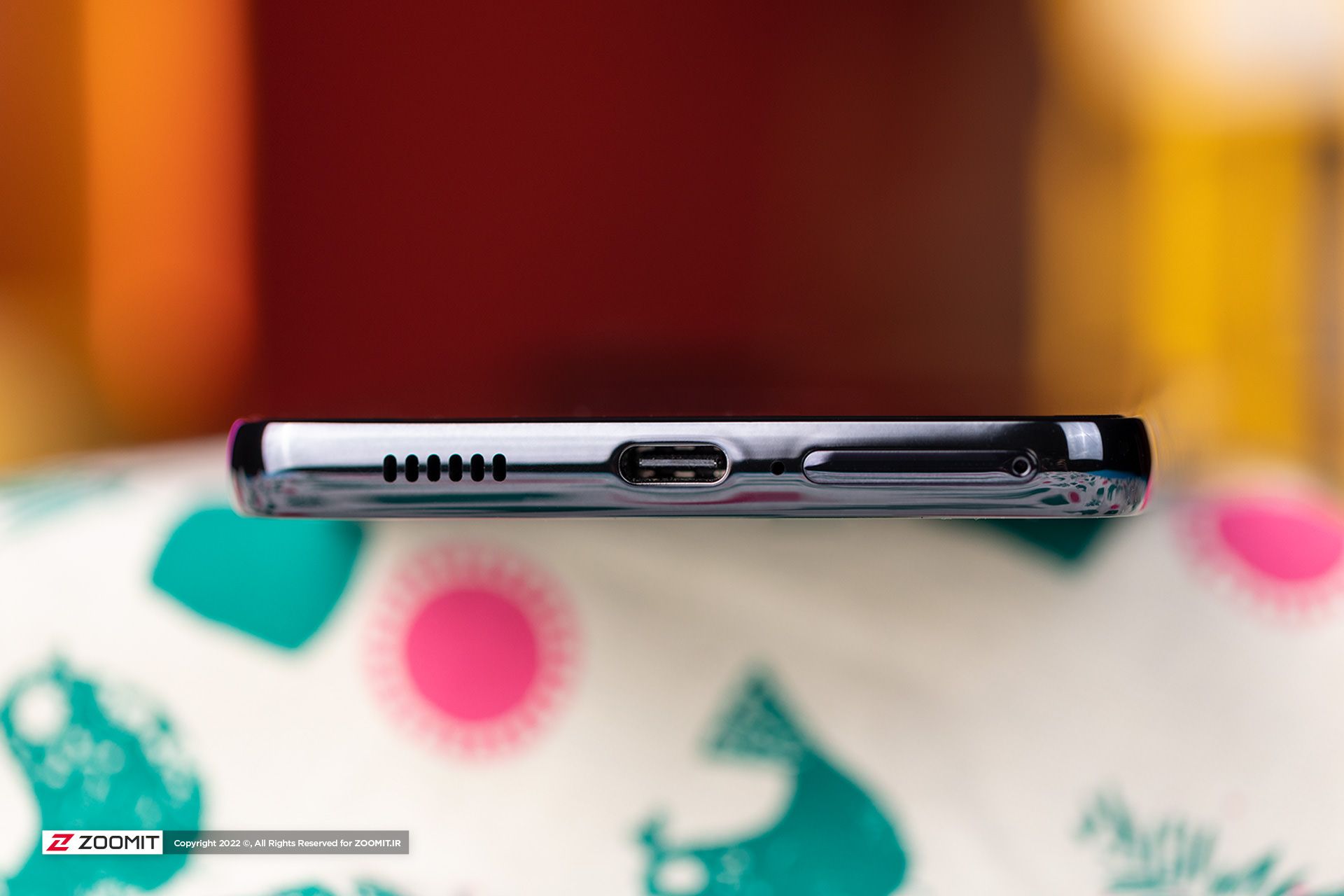
To measure the Galaxy A53’s throughput, we ran our tests at 200 nits of brightness, a resolution of 2400 by 1080 pixels, and a refresh rate of 120 Hz; Of course, all data connections disconnect along with the speaker sound. The phone in question on PCMark lasted 12 hours and 13 minutes. As you can see in the table, the Galaxy E52 completes our similar test in 9 hours and 16 minutes, and the A52s charge in 10 hours and 13 minutes.
Compare Galaxy A53 charging with Galaxy A52 and A52s | |||||
|---|---|---|---|---|---|
| Product ٫ Test | Display | Battery | Time required to charge | Video playback | PCMark |
| Dimensions and resolution | Million amp-hours | Minutes: hours | Minutes: hours | Minutes: hours | |
| Galaxy A53 (120Hz) | 6.5 inches 2400 × 1080 pixels | 5000 | – | 18:27 | 12:13 |
| Galaxy A52s 5G (120Hz) | 6.5 inches 2400 × 1080 pixels | 4500 | 1:28 | 18:10 | 10:13 |
| Galaxy A52 5G (120Hz) | 6.5 inches 2400 × 1080 pixels | 4500 | – | 13:44 | 9:16 |
Based on the results, it can say with certainty that for those who care about the charging category, the Galaxy E 53 could be a better choice. Still, it should not overlook that users have to purchase the device charger separately, and this can be somewhat challenging, especially in our country.
Camera
Finally, we come to the part where we talk about the middle ground. The Galaxy E 53 still shows in the camera section that it relies on its brothers; Because its camera hardware on paper is no different from the previous generation and the A52s. Naturally, this section will be beautiful and essential for people who deal with social networks, content production or photography, and videography.
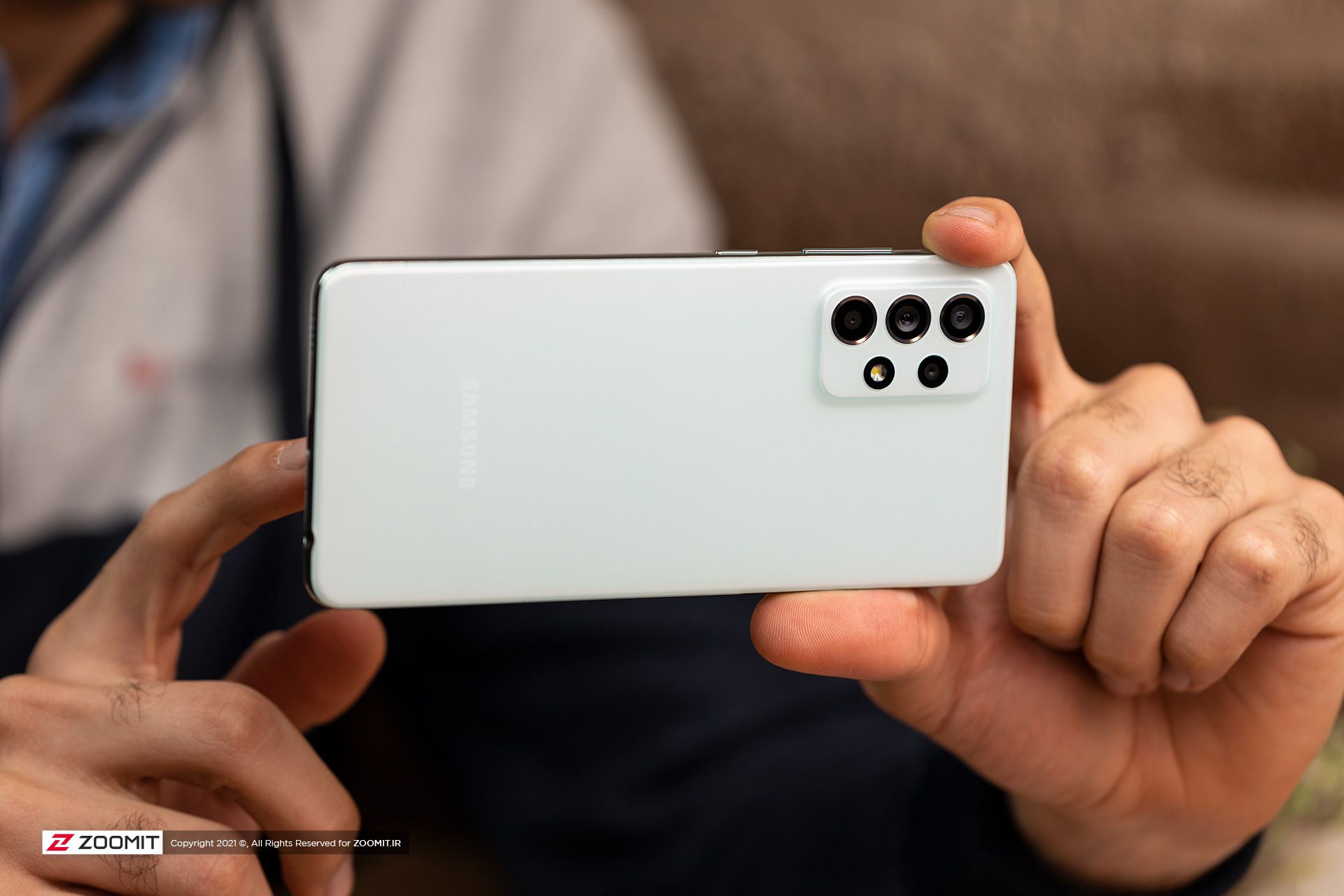
The Galaxy A53 and the Galaxy A52 family benefit from a quad-camera array, including wide-angle, ultraviolet, macro, and depth-of-field cameras. For the primary camera (wide), Samsung uses a 64-megapixel sensor with a pixel size of 0.8 micrometers, a lens with a focal length of 26 mm, and an aperture of f / 1.8, which also supports OIS optical image stabilization for a more stable images.
The UltraVide camera on the Galaxy A53 and the Galaxy A52 family has a 12-megapixel sensor, and the spheres did not use autofocus or optical image stabilization to reduce the cost of construction. The other two cameras are macro and depth gauges, which use five-megapixel sensors. On the front of the device is a 32-megapixel module at the top of the screen.
In general, we did not experience any significant differences in image quality until we got our hands on Samsung’s new midrange. The dynamic range of all three handsets in this price range and comparison with the competitors looks pretty favorable. The ISP and the Galaxy E 53 image processing algorithms do not offer a significant advantage over older camera hardware.
Sample images recorded with the Galaxy A53 camera
In all three handsets, the Ultraviolet camera performs weaker than the primary camera when recording dynamic range, So that you can easily see the loss of image detail. However, buying a new phone would be completely wrong with the idea that it could perform better in capturing images with a high dynamic range.
On the other hand, the details and colors in the three devices are very close. Their primary camera and ultraviolet have excellent image contrast, which may seem excessive in some scenarios. The Galaxy A53 Ultraviolet Camera captures a color distortion and a purple halo that you can see when zooming in at the intersection of dark and light subjects; Of course, under the same circumstances, such a scenario is possible for the Galaxy A52.
Sample images recorded with the Galaxy A52s camera
In low light conditions, one should not expect a special surprise, and we see almost the same performance as the previous model; The picture quality of all three phones is deficient, the images lose their contrast, and the details are sacrificed; Fortunately, in such a situation, the Night Mode feature helps to improve the photos a lot.
Sample images recorded with the Galaxy A52 camera
All models do not have a telephoto camera in the magnification section and precisely use the same digital process. Another critical point in the camera section is the Upscale of selfies from 8 to 12 megapixels. Finally, no distinction can make between the macro camera quality and the portrait images between Samsung’s three intermediates.
Other factors influencing the selection
As you can see, we have compared the Galaxy A53 to the previous generation and the A52s in five main areas. However, some cases should mention; For example, in terms of software, the Galaxy A53 comes with an Android 12 operating system and One UI 4.1 user interface. Samsung says that the phone will receive four major software updates and five years of security updates.
![]()
On the other hand, the Galaxy A52 and A52s used Android 11 and Samsung’s One UI 3.1 user interface when released. It is unclear whether they will receive the four software updates; Therefore, the new Korean intermediary can stay up-to-date terms of software and receive new capabilities.
Another significant point is the price of the models. Currently, the Galaxy A53 is priced between 11 and 12 million tomans in our market; While the basic configuration of the Galaxy, A52s is traded in the range of 9 to 10 million Tomans. As mentioned in the comparison, there is not much difference between the two phones, and sometimes even cheaper phones look better; So maybe buying a Galaxy A53 with the current price tag is not particularly justified.
summary and Conclusion
In the following article, we tried to provide a complete comparison between the Galaxy A53 and Samsung’s two other popular intermediates, far from being biased; Of course, the three handsets have a lot in common, and we believe that buying Samsung’s new mid-range phone does not bring much feature or superiority; Therefore, users who have purchased the previous generation certainly do not need to upgrade their smartphones, and even new users can buy the Galaxy A52s at a lower cost (in the Iranian market), which is superior in terms of processing.
| Comparison | Samsung Galaxy A53 5G | Samsung Galaxy A52s 5G | Samsung Galaxy A52 5G | ||
|---|---|---|---|---|---|
| connections | |||||
| Wireless Network | Wi-Fi 802.11 a / b / g / n / ac, dual band, Wi-Fi Direct, hotspot | Wi-Fi 802.11 a / b / g / n / ac, dual band, Wi-Fi Direct, hotspot | Wi-Fi 802.11 a / b / g / n / ac, dual band, Wi-Fi Direct, hotspot | ||
| Bluetooth | 5.2, A2DP, LE | 5.2, A2DP, LE | Yes | ||
| GPS | Yes, with A-GPS, GLONASS, GALILEO, BDS | Yes, with A-GPS, GLONASS, GALILEO, BDS | Yes, with A-GPS, GLONASS, GALILEO, BDS | ||
| NFC | Yes (market dependent) | Yes (market dependent) | Yes (depending on the market) | ||
| Radio | Unknown | Unknown | |||
| USB | – USB Type-C 2.0 – OTG support | – USB Type-C 2.0 – OTG support | – USB Type-C 2.0 – OTG support | ||
| Battery | |||||
| Battery | Non-replaceable lithium polymer battery with a capacity of 5000 mAh | Non-replaceable lithium polymer battery with a total of 4500 mAh | Non-replaceable lithium polymer battery with a total of 4500 mAh | ||
| Charging speed | 25-watt fast charge | 25-watt fast charge | 25-watt quick charge (50% in 30 minutes) | ||
| Body | |||||
| Dimensions | 159.9 by 75.1 by 8.4 mm | 159.9 by 75.1 by 8.4 mm | |||
| Weight | 189 grams | 189 grams | |||
| Making | Glass front (Gorilla Glass 5), plastic back | Glass front (Gorilla Glass 5), plastic back | |||
| IP67 certified for dust and water resistance (up to one-meter depth for 30 minutes) | IP67 certified for dust and water resistance (up to one-meter depth for 30 minutes) | IP67 certified for resistance to dust and water (up to a depth of one meter for 30 minutes) | |||
| SIM card | Single SIM (nano-wire) or dual hybrid SIM (nano-wire, dual stand-by) | Single SIM (nano-wire) or dual hybrid SIM (nano-wire, dual stand-by) | Single SIM (nano-wire) or dual SIM (nano-wire, one dual stand-by) | ||
| Platform | |||||
| Operating system at the time of release | – Android 12 – One UI 4.1 | – Android 11 – One UI 3.1 | – Android 11 – One UI 3.1 | ||
| Chip | Exynos 1280 | Qualcomm Snapdragon 778G 5G (six nanometers) | Qualcomm SM7225 Snapdragon 750G 5G (eight nanometers) | ||
| CPU | 8-core (2.4 GHz dual-core and 2.0 GHz six-core) | 8-core (quad-core 2.4 GHz Kryo 670 and quad-core 1.9 GHz Kryo 670) | 8-core (dual-core 2.2 GHz Kryo 570 and six-core 1.8 GHz Kryo 570) | ||
| GPU | Adreno 642L | Adreno 619 | |||
| Memory | |||||
| Memory port | microSDXC (using the second SIM card slot) | microSDXC (using the second SIM card slot) | microSDXC | ||
| internal memory | 128 GB with 6 GB of RAM, 128 GB with 8 GB of RAM, 256 GB with 8 GB of RAM | 128 GB with 6 GB of RAM, 128 GB with 8 GB of RAM, 256 GB with 8 GB of RAM | 128 GB with 6 GB of RAM, 128 GB with 8 GB of RAM, 256 GB with 8 GB of RAM | ||
| Camera | |||||
| Main | 64-megapixel (wide-angle lens, 1 / 1.7-inch sensor size, phase-detection autofocus, optical image stabilization, f / 1.8) 12-megapixel (ultraviolet lens, f / 2.2) 5-megapixel (macro lens, f / 2.4) 5-megapixel Image depth detection sensor, f / 2.4) | 64-megapixel (26mm wide-angle lens, 0.8-micrometer pixel size, 1 / 1.7-inch sensor size, f / 1.8, phase-detection autofocus, optical image stabilization) 12-megapixel (123-degree ultraviolet lens, 1.12-micrometer f /2.2) 5 megapixels (macro lens, f / 2.4) 5 megapixels (depth detection sensor, f / 2.4) | 64-megapixel (26mm wide-angle lens, f / 1.8, phase-detection autofocus, optical image stabilization) 12-megapixel (123-degree ultraviolet lens, f / 2.2) 5-megapixel (macro lens, f / 2.4) 5-megapixel camera ( Depth detection, f / 2.2) | ||
| Capabilities | LED flash, panorama, HDR | LED flash, panorama, HDR | LED flash, panorama, HDR | ||
| Filming | 4K @ 30fps, 1080p @ 30 / 60fps; Electronic image stabilization-gyroscopic | 4K @ 30fps, 1080p @ 30 / 60fps; Electronic image stabilization-gyroscopy | 4K @ 30fps, 1080p @ 30 / 120fps; Electronic image stabilization-gyroscopy | ||
| Salafi | 32 megapixels (wide lens, f / 2.2) | 32 megapixels (26mm wide-angle lens, 0.8mm pixel size, 1 / 2.8-inch sensor size, f / 2.2) | 32 megapixels (26mm wide-angle lens, 0.8mm pixel size, 1 / 2.8-inch sensor size, f / 2.2) | ||
| Selfie filming | 4K @ 30fps, 1080p @ 30fps | 4K @ 30fps, 1080p @ 30fps | 4K @ 30fps, 1080p @ 30fps | ||
| Network | |||||
| Technology | GSM / HSPA / LTE / 5G | GSM / HSPA / LTE / 5G | GSM / HSPA / LTE / 5G | ||
| Voice | |||||
| speaker | Yes, stereo speaker | Yes, with stereo speakers | Yes, with stereo speakers | ||
| 3.5 mm jack | No | Yes | Yes | ||
| Supply | |||||
| Introduction | March 17, 2022 | August 17, 2021 | March 17, 2021 | ||
| models | – SM-A536U – SM-A536U1 | – SM-A528B – SM-A528B / DS | SM-A526B, SM-A526B / DS, SM-A5260 | ||
| Condition | Available, released September 1, 2021 | Available. Released March 19, 2021 | |||
| Approximate price at the time of supply | About 400 euros | About 450 euros | |||
| Capabilities | |||||
| Sensors | Optical fingerprint sensor (below the display), accelerometer, gyroscope, compass | Optical fingerprint sensor (below the display), accelerometer, gyroscope, proximity sensor, compass | Fingerprint sensor (sub-screen, optical), accelerometer, gyroscope, proximity sensor, compass | ||
| + ANT | + ANT | ||||
| Other | |||||
| Colors | Black, white, blue, peach | Black, white, light green, light purple | Blue, white, black, purple | ||
| Specific Absorption Rate (SAR) | 0.72 watts per kilogram (head) | ||||
| SAR EU | – 0.88 watts per kilogram (head) – 0.84 watts per kilogram (body) | ||||
| Display | |||||
| Type | Super AMOLED | Super AMOLED | Super AMOLED | ||
| Dimensions | 6.5 inches | 6.5 inches (~ 84.9% screen-to-body ratio) | 6.5 inches (~ 84.9% screen-to-body ratio) | ||
| resolution | 1080 by 2400 pixels, 20: 9 (5 405 pixels per inch pixel density) | 1080 by 2400 pixels, 20: 9 (5 405 pixels per inch pixel density) | 1080 by 2400 pixels, 20: 9 (7 407 pixels per inch pixel density) | ||
| Bodyguard | Corning Gorilla Glass 5 | ||||
| 120Hz image refresh rate | – 120Hz image refresh rate – HDR10 support – 800nm brightness (HBM) | – 120 Hz update rate – Maximum brightness of 800 nits | |||
